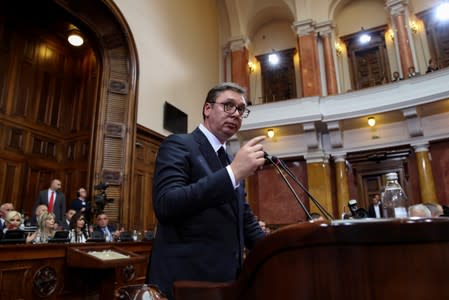Serbia says it is using 'alternative' routes to supply Serbs in north Kosovo

BELGRADE (Reuters) - Serbia is using "alternative" mountain tracks to send goods to Serb-dominated northern Kosovo to avoid having to pay a 100% import tax, Serbia's president said on Wednesday, in comments likely to further strain ties between Belgrade and Pristina.
Kosovo, a former Serbian province whose independence Belgrade refuses to recognise, imposed the tax last year as a retaliatory measure after Serbia blocked it from joining the international police agency Interpol as a separate nation.
The tax has caused hardship for the four ethnic Serb municipalities in northern Kosovo who pledge allegiance to Belgrade and openly defy the Pristina authorities. Shops and other businesses in the area were shut from Monday until Wednesday in protest over the tax.
The tax has also led to an impasse in talks on normalising ties between Serbia and majority-Albanian Kosovo - a crucial precondition for both countries to achieve their goal of one day joining the European Union.
Serbian President Aleksandar Vucic told reporters on Wednesday Serbia would continue to send supply trucks via "alternative" mountain roads often used by smugglers to get goods to its ethnic kin until the tax was scrapped.
"We will do whatever we can to bring food, water and medicines to our people ... even if I become a notorious European Robin Hood ... that crazy Vucic who sends food and water from the forest," he said.
Serbia's exports to Kosovo amount to around 500 million euros a year. Kosovo also imports from neighbouring Montenegro, Macedonia and Albania.
Kosovo's government has said that goods coming from Serbia have been replaced by imports from elsewhere in recent months.
In May Kosovo police arrested 19 people including police and customs officers in connection with suspected smuggling deals.
Kosovo declared independence from Serbia in 2008, almost a decade after NATO air strikes ended Belgrade's brutal counter-insurgency in 1998 and 1999.
Serbia still considers Kosovo part of its own territory. Backed by powerful ally Russia and several EU countries, it has been blocking Kosovo from joining international institutions.
(Reporting by Aleksandar Vasovic; Editing by Gareth Jones)

